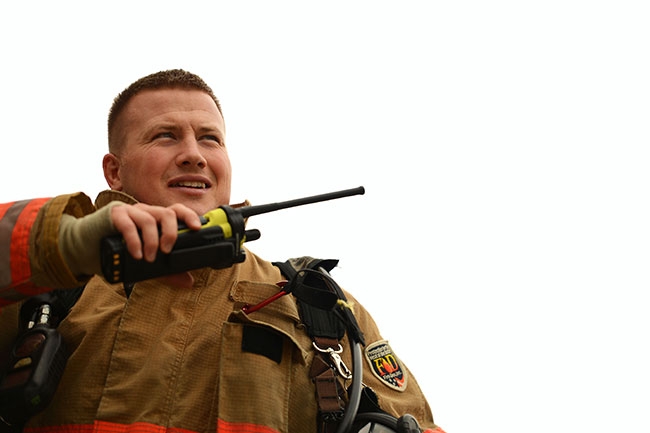
Front Seat: April 2018
By Jason Clark
Features Hot Topics OpinionNo one likes to see an ‘out of service’ tag on broken down items that are awaiting repair, especially in the fire service. Sometimes tools or apparatus are taken off the line due to lack of maintenance, an overlooked issue or an unforeseen problem. Either way, the equipment needs to be fixed quickly and efficiently to be placed back into service ASAP.
 Clark says radio systems can transmit across the entire county No one likes to see an ‘out of service’ tag on broken down items that are awaiting repair
Clark says radio systems can transmit across the entire county No one likes to see an ‘out of service’ tag on broken down items that are awaiting repairCommunication is something we can’t physically hang an ‘out of service’ tag on, but communication can still be broken. I’m not specifically speaking about apparatus radios or portable radios, but communication in general, and the many scenarios we may find ourselves communicating with various groups.
I’ve found that communication is one of the first things that can break down on the fire scene, in an emergency response or even at the station. As a company officer, you may find yourself communicating with many different people. Your crew, dispatch and chief officers all want to be kept in the know when it comes to what you are doing or where you are.
Proper communication seems so simple, so why do we lose communication or fail to communicate effectively with our colleagues, superiors or others?
To some extent, communication breakdown can be attributed to our technology, like portable radios, as well as the physical spot we keep our radio on our gear. Radios can also get bumped while on the way to a scene or getting out of an apparatus, causing it to switch channels. I’ve found that certain weather conditions and geographical areas can even have negative effects on our digital simulcast system, causing patchy service and unreadable transmissions in some circumstances. Returning to the truck to use the apparatus radio or relaying info to another unit can be a solution to this issue.
One of the great things with our radio system is that we can transmit across the entire county (which is great for mutual aid responses) and I can hear every other unit clear as a bell. However, during major weather events when multiple emergencies, such as downed hydro wires and motor vehicle collisions, are happening all at once, airtime is at a premium. I may turn on my radio to let dispatch know we are responding only to have unknowingly interrupted another truck or be interrupted by another unit responding 40 kilometres away. The best solution is to be clear and concise and know the address and cross streets before jumping on the truck.
I’m not a radio guru or communication expert by any means, but I can tell by the tone of a dispatcher’s voice if they have a lot on their plate. I went to clear my truck off a call once, only to be told by dispatch very firmly that the incident commander had done that several seconds prior on another radio channel. I didn’t know this information as the incident commander and myself didn’t communicate with each other, which would be a simple fix in the future. I was also unaware that there was a structure fire happening in another county.
But what about communication within the station? Where are the places do we go wrong here?
Here’s an example: If I were to bring a 20 litre jug of diesel up to a gasoline powered chainsaw to fill, I would be sent back to get about a cup of gasoline and then back to boot school to go over some much needed basic training. Communication is similar to the saw scenario that it’s a lot about bringing the right information at the right time, and in the correct quantity.
As a new captain, we are the first line of communication for our firefighters when they have questions. So instead of grabbing that incorrect fuel (or information) and setting both the firefighter and yourself up for failure, captains should try a different approach. It is okay to say you aren’t sure or you don’t know; it’s not okay to leave it at that and walk away. Go and source out the information for yourself from an operational guideline, user manual or ask another officer. Then relay that information with your crewmembers and try not to read the entire manual word for word.
Becoming a better communicator is an ongoing skill set that can always be strengthened. If you do find yourself in a situation where communication is a problem, it needs to be addressed and fixed immediately. Broken communication or broken tools do not benefit our fellow members or to our public, so don’t let communication sit on a shelf with an ‘out of service’ tag gathering dust.
Jason Clark has been a volunteer firefighter in southwestern Ontario since 2007. Having recently made the transition to captain from firefighter, Clark has a new perspective on riding in the front seat. jaceclark71@gmail.com
Print this page
Advertisement
- Dispatches: April 2018
- Survey finds 85 per cent of U.S. first responders face mental health challenges